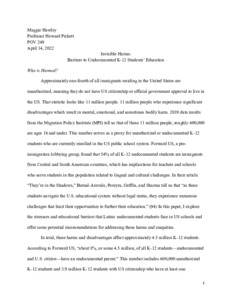| dc.rights.license | In Copyright | en_US |
| dc.creator | Hawley, Margaret F. | |
| dc.date.accessioned | 2022-04-21T13:00:14Z | |
| dc.date.available | 2022-04-21T13:00:14Z | |
| dc.date.created | 2022 | |
| dc.identifier | WLURG38_Hawley_POV_2022 | |
| dc.identifier.uri | http://hdl.handle.net/11021/35834 | |
| dc.description | Capstone; [FULL-TEXT FREELY AVAILABLE ONLINE] | en_US |
| dc.description | Margaret F. Hawley is a member of the Class of 2022 of Washington and Lee University. | en_US |
| dc.description.abstract | Approximately one-fourth of all immigrants residing in the United States are unauthorized, meaning they do not have US citizenship or official government approval to live in the US. That statistic looks like 11 million people. 11 million people who experience significant disadvantages which result in mental, emotional, and sometimes bodily harm. 2019 data results from the Migration Policy Institute (MPI) tell us that of these 11 million people, roughly 600,000 are ages 16 and under. This number serves as a proxy for unauthorized or undocumented K-12 students who are currently enrolled in the US public school system. Forward US, a pro-immigration lobbying group, found that 54% of all K-12 undocumented students are immigrants from Central and South American countries, which has implications for teachers and schools who serve students in this population related to lingual and cultural challenges. In their article "They're in the Shadows," Bernal-Arevalo, Pereyra, Griffin, and Sharma tell us that "as these students navigate the U.S. educational system without legal status, they experience numerous challenges that limit their opportunities to further their education." (94) In this paper, I explore the stressors and educational barriers that Latinx undocumented students face in US schools and offer some potential recommendations for addressing these harms and inequities. [From introductory section] | en_US |
| dc.description.statementofresponsibility | Maggie Hawley | |
| dc.format.extent | 20 pages | en_US |
| dc.language.iso | en_US | en_US |
| dc.rights | This material is made available for use in research, teaching, and private study, pursuant to U.S. Copyright law. The user assumes full responsibility for any use of the materials, including but not limited to, infringement of copyright and publication rights of reproduced materials. Any materials used should be fully credited with the source. | en_US |
| dc.rights.uri | http://rightsstatements.org/vocab/InC/1.0/ | en_US |
| dc.subject.other | Washington and Lee University, Shepherd Poverty Program | en_US |
| dc.title | Invisible Harms: Barriers to Undocumented K-12 Students' Education | en_US |
| dc.type | Text | en_US |
| dcterms.isPartOf | RG38 - Student Papers | |
| dc.rights.holder | Hawley, Margaret F. | |
| dc.subject.fast | Noncitizens -- U.S. states | en_US |
| dc.subject.fast | Children of noncitizens -- Education | en_US |
| dc.subject.fast | Education | en_US |
| dc.subject.fast | Latin Americans | en_US |
| local.department | Shepherd Poverty Program | en_US |
| local.scholarshiptype | Capstone | en_US |
